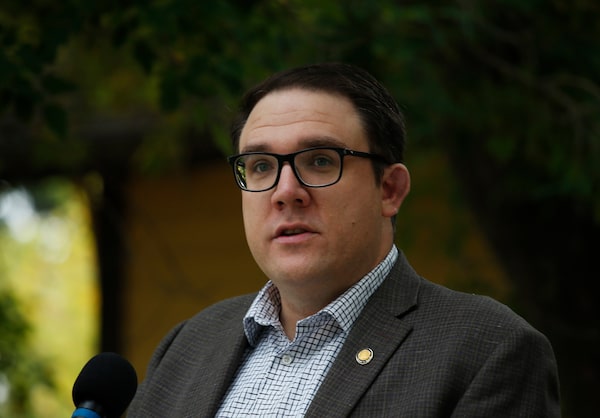
Alberta Environment and Parks Minister Jason Nixon during a news conference in Calgary, on Sept. 15, 2020.Todd Korol/The Canadian Press
The Alberta government has introduced a revamped version of legislation that had given the province the power to restrict and control shipments of its energy exports as a means to “fight back” against other Canadian jurisdictions that oppose pipeline projects or otherwise block the province’s oil and natural gas.
The old legislation, which contained a sunset clause, expired last month with nothing immediately lined up to replace it – even though proclaiming the law was a key campaign promise of the governing United Conservative Party. The new version of the province’s “turn-off-the-taps” law will exclude refined products such as gasoline and diesel in a bid to shield it from future Constitutional challenges.
Alberta Environment Minister Jason Nixon said on Tuesday his government wants to have a new law in place only as a last resort in future disputes over the province’s ability to export its resources. He emphasized it’s not about reviving a fraught period of battles with British Columbia over the issue of the Trans Mountain pipeline expansion.
“Using this legislation will continue to be the final and not the first step in protecting Alberta’s interests,” Mr. Nixon told reporters. “Like a fire extinguisher that you only use in case of an emergency.”
The previous legislation that gave Alberta powers to restrict and control shipments of natural gas, oil and refined fuels to destinations outside the province expired on April 30, just days after the Federal Court of Appeal weighed in on a legal dispute between B.C. and Alberta over the law. The court set aside an injunction granted to B.C. in its constitutional fight over the matter, saying the dispute is more theoretical than real. The law had never been used.
The previous legislation was introduced by Rachel Notley’s NDP government three years ago, during a period of heightened tensions between Alberta and B.C. over the latter government’s opposition to the Trans Mountain expansion project. The act was proclaimed into law by the United Conservative Party government on April 30, 2019.
At the time, Premier Jason Kenney talked about high fuel prices in B.C., and said “the B.C. government is doing everything it can to block the expansion of the very pipeline that would get Alberta oil and gas to the gasoline-constrained Lower Mainland.”
The new Preserving Canada’s Economic Prosperity Act, introduced on Tuesday and retroactive to May 1, replaces the previous legislation by the same name. Officials say the legislation is virtually unchanged, except the bill has no sunset clause and refined products are excluded.
The Alberta government argues the Constitution gives the provinces the authority over the interprovincial export of primary production natural resources, and by excluding references to refined fuels, the legislation aligns with this concept.
The issue of Alberta’s intentions with the bill remains. In 2019, B.C. argued in its court filings against the original Alberta law that it was unconstitutional because it illegally seeks to punish another province. The legal filing used Mr. Kenney’s own words to argue that point, noting that Mr. Kenney previously said Bill 12 would allow the province to “fight back” against the “NDP in Victoria.”
Alberta is still saying the bill is designed to give the government the ability to “fight back.” University of Alberta constitutional law professor Eric Adams said the new legislation remains constitutionally dubious, even with the change. Especially if the law was ever used, a court might decide that Alberta is acting in a unfairly punitive fashion against another province.
The legislation, he said, “remains, as it probably was always intended to be, a kind of threat.”
Mr. Nixon told reporters on Tuesday that while the Alberta-B.C. dispute was the original impetus for the legislation, “I want to stress this is not just about B.C.”
He said his government is excited at progress made on the Trans Mountain pipeline expansion project. The B.C.-Alberta relationship, he added, has “gone very well, as of late.”
The minister also added that the legislation would not apply to international disputes, such as Enbridge Inc.’s Line 5, which has been ordered shut by Michigan Governor Gretchen Whitmer. The federal government has warned it is prepared to intervene in the matter. “We govern our relationship with other countries when it comes to pipelines through treaties,” Mr. Nixon said.
We have a weekly Western Canada newsletter written by our B.C. and Alberta bureau chiefs, providing a comprehensive package of the news you need to know about the region and its place in the issues facing Canada. Sign up today.
 Kelly Cryderman
Kelly Cryderman